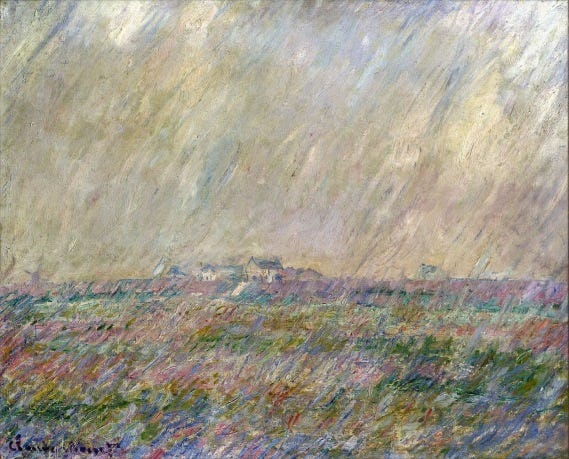I’m Luke Craven; this is another of my weekly explorations of how systems thinking and complexity can be used to drive real, transformative change in the public sector and beyond. The first issue explains what the newsletter is about; you can see all the issues here.
Hello, dear reader,
Canberra is in lockdown this week, for the first time in over fifteen months. All things considered, we have very little to complain about. Ken Behrens has our back.
Thinking
For me, lockdown offers something of a forced pause and provides the opportunity to think slowly on some of the more challenging strands of thought that I have yet to resolve. In the spirit of questions as tools for thought, here are some that I plan to sit with this week, perhaps write about, and work closer toward something that some people might call a resolution:
Does the widespread adoption of more systemic ways of doing and being require a crisis or fissure in our collective consciousness? In conversation good friend Toby Lowe about the trajectory and growth of the Human Learning Systems (“HLS”) approach in the UK, Toby has often reflected that local government austerity provided an opportunity to experiment with radical new approaches. Without local government austerity, perhaps HLS would not have been possible. For me, this begs the question: Without a similar crisis in Australia, is a similar trajectory possible? What would it mean for Australian systems practitioners to manufacture a crisis to create a space in which systems approaches become both politically acceptable and practically supported?
How can we generate a nuanced conversation about the benefits of systems practice without dismissing everything that has come before? I participate in a lot of public conversations and informal communities of practice focused on the power and possibility of more systemic ways of doing and being. Recently, I’ve found myself challenged by the goodies and baddies narrative that sits at the heart of a lot of those conversations: systems approaches are the white knight that rides in to liberate people from the scourge of everything that has come before. There is a lot that is dangerous—and dangerously counterproductive—about that narrative. And yet, psychological studies have shown that having an enemy and bagging them out is a powerful tool to drive transformational change. I’m curious about how we inject more nuance into these conversations? How might we stretch our brains be comfortable with both/and thinking as the basis of innovation?
How can we ensure that the revival/rediscovery of systems thinking and complexity-based approaches does not become a site of colonialism or cultural appropriation? Indigenous thinking, as many, many others have noted, has always recognised that the world is complex and has found ways to communicate the rich and systemic independencies that make up our lives. In many Indigenous societies, settlement and colonisation has meant the active suppression and erasure of these forms of knowing in ways that have been deeply harmful and destructive to Indigenous lands and lives. With this context, the revival of systemic ways of doing and being must be—at least in part—a decolonial project. My sense is that on its best days, the systems practice community recognises and does its best to respond to this imperative. I certainly try my hardest. But there remain worse days in which we veer close to appropriating the same thing we once sought to erase. On those days, we need to challenge each other to do better.
Reading
This past week I had the pleasure of being in conversation with Kelly Ann McKercher and Elise Motalli as part of a podcast series exploring the edges of human-centred design. Kelly Ann asked an excellent question about where we can turn for new language to help us make sense of the world and our experience of it. For me, it is poetry that has always been the generative site for that possibility.
I’ve written here before about T. S. Eliot and Gerard Manly Hopkins as influences on my thinking, but more recently I’ve found myself lost in the work of Louise Glück and its frequent allusions to the boundaries and incompleteness of individual perspective.
In Nest she writes:
“…in my life, I was trying to be / a witness not a theorist.”
In Formaggio she contemplates the possibility of collective resonance or connection despite the idiosyncrasy of individual testimony:
“The world / was whole because / it shattered. When it shattered, / then we knew what it was. / It never healed itself. / But in the deep fissures, smaller worlds appeared.”
In Circe’s Power, she speaks beautifully about the paradox of systemic perception being enabled by an acknowledgement of our epistemic limits:
“My friend, / every sorceress is / a pragmatist at heart; nobody / sees essence who can’t face limitation.”
As I’ve written before, the limitations of language and expression is part of what makes them exciting. We cannot hold complexity. But, like Louise, we can attempt to make use of the language we already have, at varying levels of metaphor and abstraction, to muddle through. Each attempt we make is a small, exaptive contribution to living with the deep fissures in our collective experience.

A departing thought
By the way: This newsletter is hard to categorise and probably not for everyone—but if you know unconventional thinkers who might enjoy it, please share it with them.
Find me elsewhere on the web at www.lukecraven.com, on Twitter @LukeCraven, on LinkedIn here, or by email at <luke.k.craven@gmail.com>.





